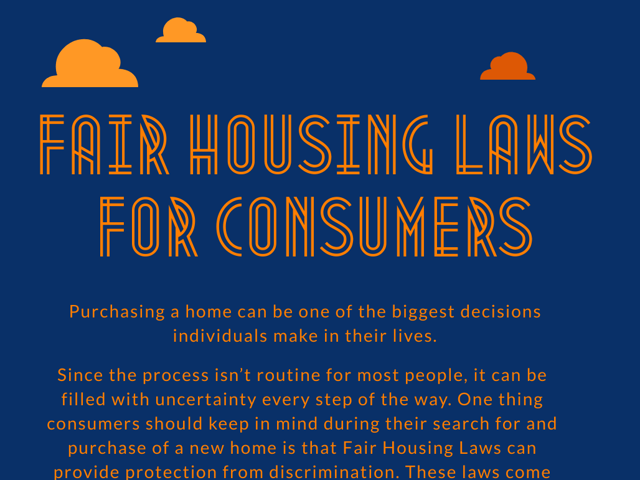
Fair Housing Laws for Consumers
Purchasing a home can be one of the biggest decisions individuals make in their lives. Since the process isn’t routine for most people, it can be filled with uncertainty every step of the way. One thing consumers should keep in mind during their search for and purchase of a new home is that Fair Housing Laws can provide protection from discrimination. These laws come from the Fair Housing Act, which was passed in 1964.
What Does the Fair Housing Act Do?
The Act protects people from discrimination when purchasing or renting a home, seeking a mortgage or housing assistance, or engaging in other housing-related activities, such as home appraisals and securing insurance coverage. On a federal level, the scope of the Act prohibits discrimination based upon race, color, national origin, religion, gender, family status, or disability. States may impose additional protections for other identified classes, including marital status, source of income, sexual orientation, gender identity, and victims of domestic violence.
What Are Your Rights?
In sum, this means that as a consumer, you can expect equal treatment and access to all properties by landlords, agents, brokers, realtors, and sellers. This includes a right to the following things:
- Housing in your price range will be made available without discrimination
- Equal services will be rendered by all professionals.
- There will be no discriminatory limitations on communities or areas for housing.
- There will be no discriminatory financing, insurance coverage, or appraisals for housing.
- No questions based upon your status within any of the protected classes will be asked.
- You will be free from harassment and intimidation while exercising your fair housing rights.
What Practices Are Illegal?
The Act prohibits the following actions in order to protect consumers:
- Misrepresenting the availability of a property
- Limiting the use of specific facilities
- Advertising a preference for a certain type of home buyer
- Discrimination in the selling process
- Applying additional criteria to those in protected classes
- Asking questions about potential tenants or purchasers’ status within protected classes
- Steering potential buyers or tenants toward certain kinds of housing or specific geographical areas
Get Help Here
In the event that you have experienced discrimination, would like to file a complaint, or would simply like more information about the Fair Housing Laws for consumers, you may contact the U.S. Department of Housing and Urban Development (HUD) at (800) 699-9777 or by visiting their website.

Keep Reading

Real Estate License Exam Blog
How Hard is the Texas Real Estate Exam?
Starting a real estate career in Texas is an exciting venture. One of t…

Real Estate License Exam Blog
What’s on the California Real Estate Exam?
The California Real Estate Exam is a critical step for anyone looking t…

Real Estate License Exam Blog
How to Do Well on the Georgia Real Estate Exam
The Georgia Real Estate Salesperson Examination is required by the Geor…